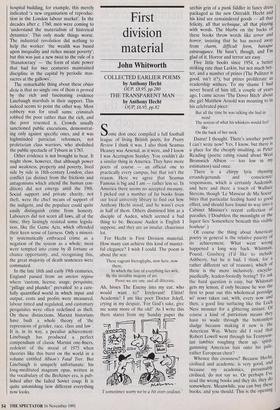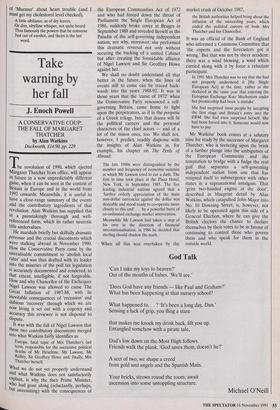First division material
John Whitworth
Some don once compiled a full football league of living British poets, for Poetry Review I think it was. I also think Seamus Heaney was Arsenal, as it were, and I know I was Accrington Stanley. You couldn't do a similar thing in America. They have more poets of course — an official one to practically every campus, but that isn't the reason. Here we agree that Seamus Famous is big and I am — rather less so. In America there seems no accepted measure. I picked out a number of fat books from our local university library to find out how Anthony Hecht stood, and he wasn't even in half of them. Others dismissed him as a disciple of Auden. which seemed a bad thing to be. Because Auden is English I suppose, and they are an insular, chauvinist lot.
For Hecht is First Division material. How many can achieve this kind of master- ful elegance? I wish I could. The poem is about the sea: These vagrant hieroglyphs, now here, now there,
In which the late of everything lies writ, By the invisible majesty of art, Prove we are one, and all illiterate.
Ah, hisses The Enemy into my ear, who would want to? Irrelevant! Elitist! Academic! I am like poor Doctor Jekyll, crying in my despair, 'For God's sake, give me some more of the old!' As I write this there stares from my Sunday paper the 'I sometimes worry we're a bit over-zealous.' urchin grin of a punk fiddler in fancy dress packaged as the new Oistrakh. Hecht and his kind are remaindered goods — all that
felicity, all that technique, all that playing with words. The blurbs on the backs of these books throw words like terror and horror, insisting that he has moved away from charm, difficult form, baroque extravagance. He hasn't, though, and I'm glad of it. Horror and terror are easy.
Five little books since 1954, a better striking rate than Larkin, but not much bet- ter, and a number of prizes (The Pulitzer is good, isn't it?), but prizes proliferate as readership withers. To my shame I had never heard of him till, a couple of years ago, I came across 'The Dover Bitch' about the girl Matthew Arnold was moaning to in his celebrated piece: But all the time he was talking she had in mind
The notion of what his whiskers would feel like
On the back of her neck.
Damn! I thought. There's another poem I can't write now! Yes, I know, but there is a place for the cheaply insulting, as Peter Reading (poetic rating round about West Bromwich Albion — too low in MY estimation) said once.
There is a chirpy lyric rhyming errands/gerunds and conscience/
responsions, which is certainly Audenish,
and here and there a touch of Wallace Stevens, though 'Le Masseur de Ma Soeur bites that particular feeding hand to good effect, and should have found its way into a Cabinet Minister's recent collection of
parodies. (-Doubtless the moonlight or the liquor lies/ Somewhere beneath this visible bonheur'.)
Of course the thing about American poetry in general is the relative paucity of its achievement. What went wrong
happened a long way back. Whitman, Pound, Ginsberg (I'd like to include
Ashberly, but he is bad, I think, for a
rather different set of reasons), which of these is the more inclusively, encyclo-
paedically, leaden-footedly boring? To ask the hard question is easy, but Whitman gets my lemon, if only because he was the first to pour out this wholemeal porridge wi' nowt taken out, with, every now and then, a good line surfacing like the Loch Ness monster for a glittering instant, of course a kind of patriotism means they have to wade through the bottomless
sludge because making it new is the American Way. Where did I read that Robert Lowell went through his Tennyson- ian iambics roughing them up, spirit gumming American hair onto his pale, rather European chest?
Whence this crossness? Because Hecht, civilised and academic, is very good, and because my academics, presumahlY civilised, do not say so. Or perhaps I've read the wrong books and they do, they do somewhere. Meanwhile, you can buy these books, and you should. This is the opening of 'Murmur' about heart trouble (and I must get my cholestorol level checked).
A little sibilance, as of dry leaves, Or dim, sibylline whisper, not quite heard: Thus famously the powers that be converse Just out of earshot, and theirs is the last word.











































































 Previous page
Previous page